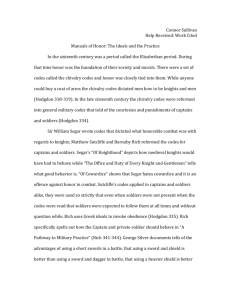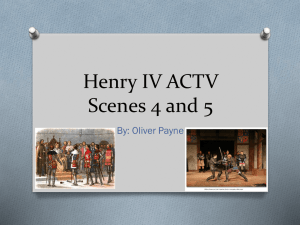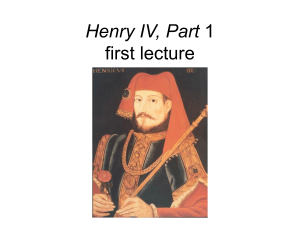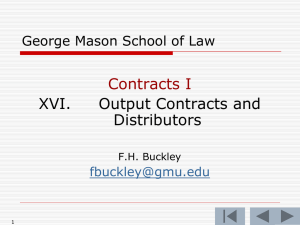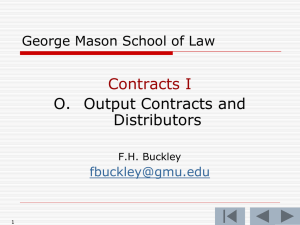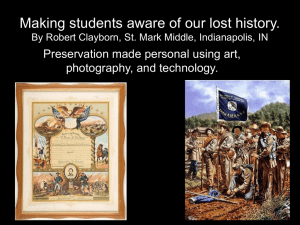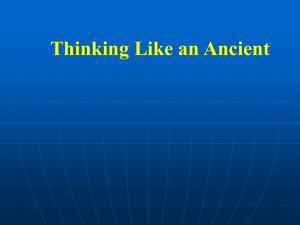Film Adaption Analysis Henry IV
advertisement
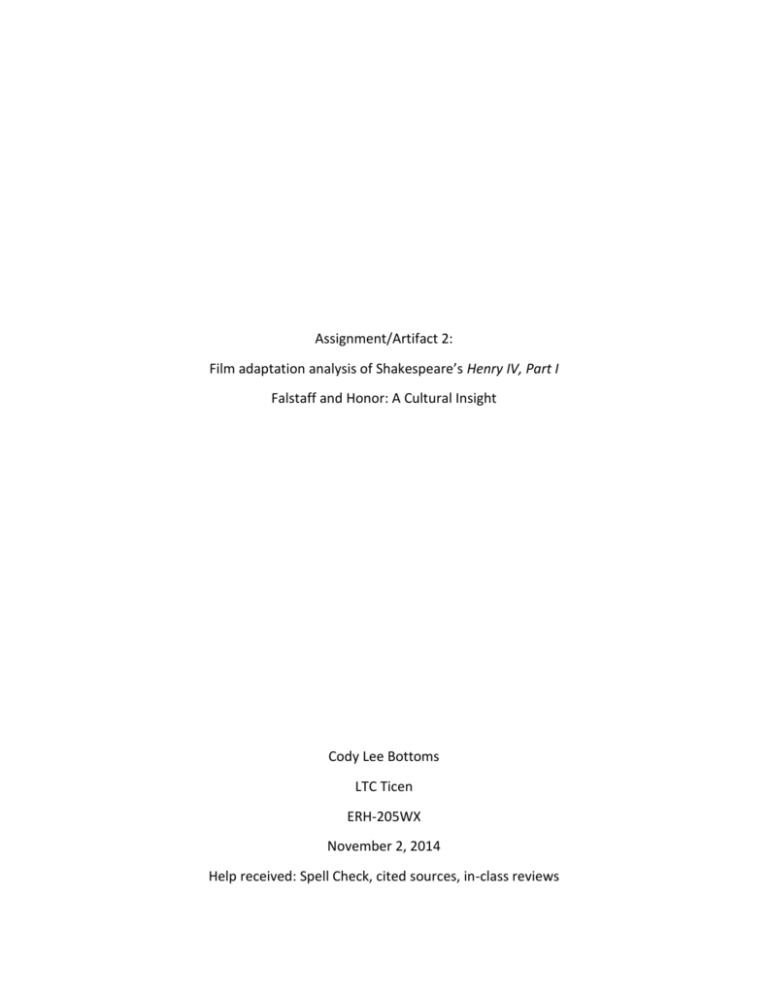
Assignment/Artifact 2: Film adaptation analysis of Shakespeare’s Henry IV, Part I Falstaff and Honor: A Cultural Insight Cody Lee Bottoms LTC Ticen ERH-205WX November 2, 2014 Help received: Spell Check, cited sources, in-class reviews Bottoms 2 Falstaff is a character very central to the plot of Shakespeare’s Henry IV, Part I. He represents an image of everything that a knight should not be in almost every way possible throughout a majority of the play. Not only this, he is used as the character for comic relief in a few Shakespeare plays. He represents the opposite of honor in many ways. Falstaff is portrayed in varied ways throughout different productions of Henry IV, Part I. In the text of the play that was read for class, Falstaff takes on a sort of playful and obnoxious tone through the way that the text is presented in the work. The Falstaff presented in the Hollow Crown film production is much more developed because of the ability to gain perspective insights that allow more interpretation than a reading of the play or a production of the play on stage would. In all instances though, Falstaff is a very disreputable individual in which no Prince or nobleman should be spending any time with. He is truly a fallen knight that represents all things dishonorable. The idea of honor was an idea central to the way of life for knights and soldiers in the fifteenth century. It sat as one of the top aspects of the Chivalric code that dictated the way life was lived for these men. It defined the characteristics of a knight or soldier as well as the way that battles were conducted in the time. The ideals that are central to honor are roughly as follows: “Fear God and defend the Christian faith, be charitable and comfort those who are afflicted, serve Prince and country, forgive follies and offenses of other men, esteem truth and maintain it, avoid sloth and superfluous ease, spend time in honest and virtuous actions, revere Magistrates and converse with persons of honor… frequent war…” (Segar, 336). Falstaff seems to have some Godly fear, however he does not defend the Christian faith at all. He is Bottoms 3 everything but charitable; he begs and robs constantly as well as does nothing to comfort people. The only time that Falstaff asks forgiveness of anyone it is when he falsely accused the Innkeeper of stealing his things and did not want to be kicked out. Falstaff lies constantly throughout the play from being attacked by hundreds of men in the woods after Hal played the prank on him even to lying about killing Hotspur after the battle with the rebels. Falstaff is disreputable once again in almost every sense. The reading of Falstaff’s speech on honor in act V, scene II, lines 127-137 of the play seems to mock the idea of honor in a cowardice manner calling it a “detraction” (V,II,135-36). Regarding my understanding and interpretation of Falstaff, this speech seemed to come across as a sarcastic and scathing speech. Falstaff therefore in the reading and context of the play may then have become more likable the audience that the play was originally written for in that the general public probably would not have been very willing or happy to go fight yet another war for a monarch. There was also only prior cultural knowledge and text that had been read to get a sense of the scene. From this previously understood context I imagined a Falstaff standing aside in a field looking at all of the soldiers with contempt whilst they worked and prepared for battle in their camp. Falstaff being who I thought he was in the play, I thought that he was just trying to reason to himself a way to weasel out of fighting in the battle with his speech for his lack of honor. In the reading of the play, Falstaff’s past as a knight is not expressed as pronouncedly as it is in the Hollow Crown film. Bottoms 4 The Hollow Crown’s version of Falstaff is what I would consider a more realistic portrayal of the character. The film’s version of Falstaff is still very much the same disreputable person that he was within the context of the play’s text, however there is a more solemn and serious side to him as well that expresses itself multiple times throughout the play including the scene in the tavern with Hal when they rehearsed the discussion with Henry that Hal would have and of course the soliloquy that “Sir” John Falstaff gives in the encampment before the battle that is eminent. The Film is able to play with this scene a bit to make it more serious and have a more lasting impact. Falstaff in this scene walks into the encampment and looks around him at all of the men preparing for battle. He makes the realization at this point that a majority of these people are going to die in the coming battle. The scene is done with a foggy air about and an overcast sky; perhaps foretelling of the dark and looming battle to come. As well as this, the men all look very dirty and worn out in generally poor conditions. On top of all of this, Falstaff’s soliloquy is presented as a thought within the confines of his mind, though what he is thinking is gravely written all over his face as he makes his way through the encampment. This ability to create these details and emphasize on these aspects allows the film to be more powerful with its construction of the scene than the reading of the play. When Falstaff’s speech is delivered in the Hollow Crown he seems not to be shying away from battle or duty, like in reading the play so much as condemning and damning it as an experienced knight who has been through many campaigns and has had to see more than his fair share of people die around him in a horrible mess of sloppy thick mud, guts, and blood. He is not here mocking honor so much as damning it as valueless saying essentially that it cannot heal wounds, take away the grief of the families of the dead, or do much of anything else (V,II,129-32). Falstaff Bottoms 5 asserts that you cannot see, hear, or feel it thus it is no good. He notes that if it cannot “live with the living” than it is a truly worthless reason to fight. After all that Falstaff has seen, those battles make him a valid source for this observation. This very deep philosophical note that he has made causes one to re-evaluate the character of Falstaff in many facets. It calls to attention his tavern life which is probably a result of all of the things that he has seen throughout his career. He is probably always drunk because he wants to forget all of the things that he has seen. He is probably living day to day rather than fight because he wants to be comfortable and avoid as much battle as possible. This presents a very different view of Falstaff from his conventional view. It would even go so far as to lessen the judgment on his lifestyle choices. Perhaps though, Falstaff was a character similar to a few knights named in Chaucer’s Canterbury Tales that were intended to denounce chivalric code. One could argue that through either the play’s textual interpretation or the film’s interpretation of Falstaff’s speech that it was in truth designed to denounce the notion and ideals of chivalric code. From Falstaff’s point of view, this idea of honor is worthless. As previously pointed out, Falstaff is himself and old and seasoned knight. The battles that he has been in and the things which he has seen give his point validity. This brings to question that if a member of the knights thinks that chivalric code is a ridiculous notion, then what do the members of the audience or the general public believe? Instead though of striving for this false ideal like Chaucer’s knights, Falstaff accepts that it is a flawed ideal filled with corruptness and therefore decides it better to go about life in a more logical manner more conducive to his lifestyle. Bottoms 6 This brings yet another interpretation to bear that maybe Falstaff has an awareness that others in the play do not. He may be lazy and un-honorable, but maybe he realizes that so many people die fighting for all of these nobleman bidding for power, religion, and this idea of honor that he states is valueless. Through his speech he expresses this in both depictions of the play. It could be argued that Falstaff is perhaps wiser than most characters within the play, he is just troubled or just very bad at coping with issues that he has from his experience. Through his realization that all of this fighting is valueless and does nothing but hurts the majority of people, he is in-fact seemingly wiser than those honorable and chivalric character’s above him though his morals be of lower stature. In Conclusion, Falstaff is a central character to Shakespeare’s Henry IV, Part I that represents an opposite to the ideals of honor in most ways. He is a disreputable character who is lazy and dishonest. He performs many misdeeds including theft and bribery. Falstaff’s speech on honor in act V scene II of the play are central elements of both the reading of the play as well as the film production of the Hollow Crown. They are interpreted very differently in each arena though on my part. When I read the play, Falstaff’s speech came out as scathing and sarcastic in a playful manner with him trying to mock honor as a way of reasoning to himself that it was okay to avoid fighting in the impending battle. The film’s interpretation of Falstaff and his speech is a much more serious one that gives a lot of insight into his past as a knight. It is very apparent from the way that his speech is delivered that it is not so much cowardice as a resentment for the death caused by the fighting for noblemen and religion. The film has the advantage of presenting this idea more powerfully because of the techniques Bottoms 7 available for filming. Through all of this though it could be argued that through this observation Falstaff might be the wiser of the characters in the play in some aspects though he may be of lower moral and economic stature. Bottoms 8 Bibliography Henry IV, Part I, Hollow Crown. Richard Eyre, Alan Armstrong, Joe Armstrong. Universal Pictures, 2013. Shakespeare, William. The First part of King Henry the Fourth. Ed. By Barbara Hodgdon. Boston: Bedford/St.Martins, 1997. 1597. Print.
